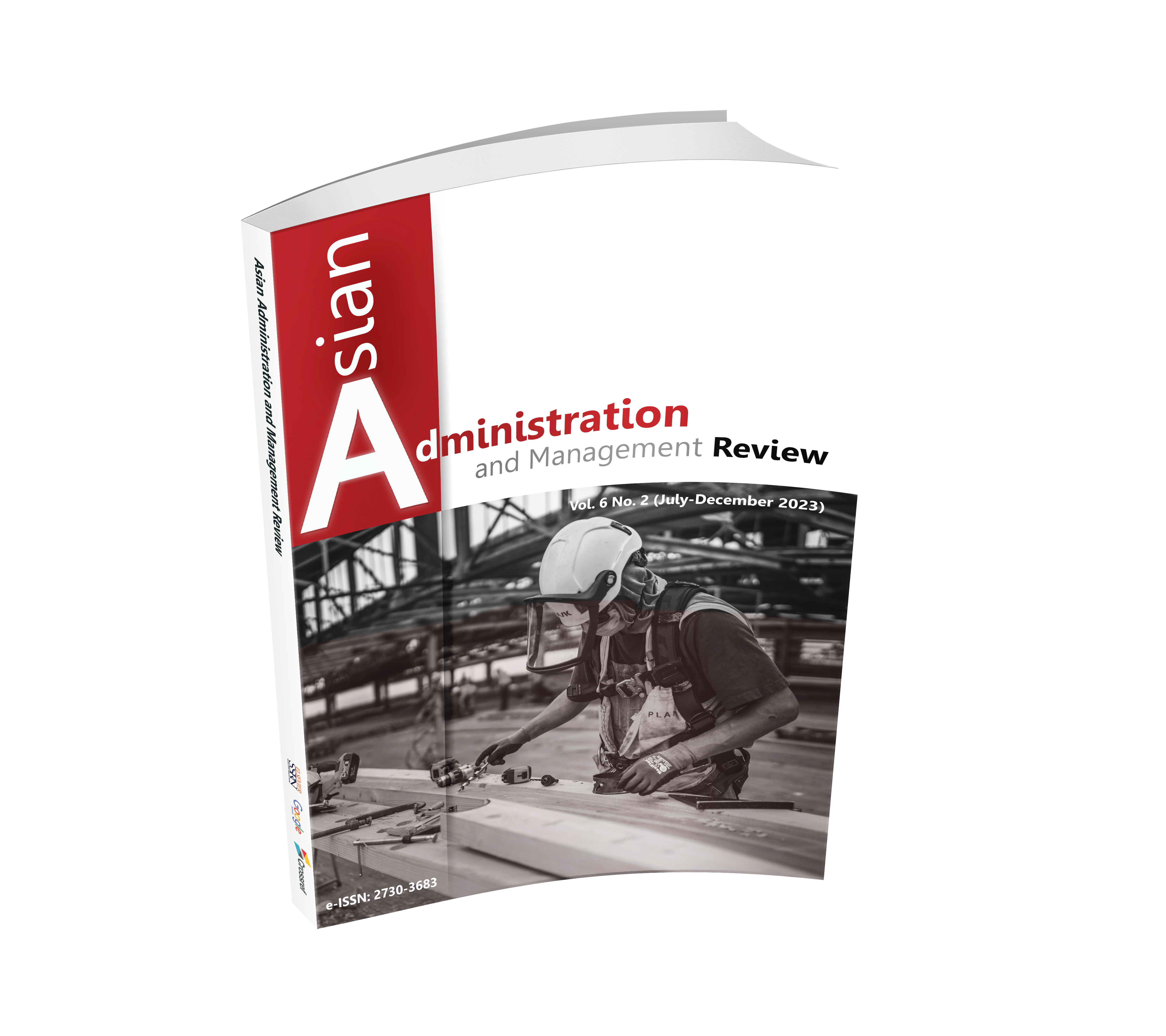EXPERIENTIAL MARKETING AND BUSINESS INNOVATION AFFECTING CUSTOMER LOYALTY IN CAFE BUSINESS
DOI:
https://doi.org/10.14456/aamr.2023.25Keywords:
Experiential Marketing, Business Innovation, Customer Loyalty, Cafe BusinessAbstract
The objective of this research was to investigate the causal variables of experiential marketing and business innovation affecting the customer loyalty in cafe business. The study was conducted with population living in Chumphon, Thailand who used to use the cafe business services. The results of multiple regression analysis revealed that experiential marketing, which includes Sense, Feel, Think, Act, and Relate, and the loyalty towards café business services, aimed to test hypotheses H1a-H1e found that all five aspects of experiential marketing significantly influenced customer loyalty to café business services at the 0.05 level. Hence, the hypotheses H1a-H1e were accepted. However, the independent variables of experiential marketing in all five aspects collectively predict and explain the dependent variable, which is customer loyalty to coffee shop businesses, with an efficiency of 57.9%. Business innovation, which includes product innovation, process innovation, service innovation, and marketing innovation, and the loyalty towards café business services, aimed to test hypotheses H2a-H2d found that all four aspects of business innovation significantly influenced customer loyalty to café business services at the 0.05 level. Hence, the hypotheses H2a-H2c were accepted. In this case, the independent variables from all four business innovation aspects jointly predict and explain the dependent variable, which is customer loyalty to coffee shop businesses, with an efficiency of 62.11%.
Downloads
References
Boonrawd, M., & Sukanthasirikul, K. (2019). The Effect of product innovation and service process innovation on marketing performance of 3 to 4 stars hotel businesses in Thailand. NRRU Community Research Journal, 13(3), 225-236.
Bunbood, A., & Phoka, A. (2021). Service Innovations Affecting the Business Success of Private Hospital in Thailand. Journal of Roi Et Rajabhat University, 15(3), 173-185.
Chandler, A. (1962). Strategy and structure: Chapters in the history of the industrial enterprise. Massachusetts: MIT press.
Cochran, W. (1977). Sampling Techniques. 3rd ed. New York: John Wiley & Sons.
Cooper, D., & Schindler, P. (2006). Business Research Methods. 9th ed. New York: McGraw-Hill.
Hair, J., Black, W., Babin, B., & Anderson, R. (2014). Multivariate Data Analysis. 7th ed. New Jersey: Pearson Education.
Hoy, W., & Rees, R. (1974). Subordinate loyalty to immediate superior: A neglected concept in the study of educational administration. Sociology of Education, 47(2), 268-286.
Kasikornbank. (2018). How to manage a coffee shop business to prosper. Retrieved from www.kasikornbank.com/th/business/sme/KSMEKnowledge/article/KSMEAnalysis/Documents/Coffee-Shop-Management.pdf.
Kotler, P., & Keller, K. (2012). Marketing Management. 14th ed. London: Pearson Education.
Lawrence, A., & Weber, J. (2020). Business and society: Stakeholders, ethics, public policy. 16th ed. New York: McGraw-Hill.
Lekcharoen, C. (2016). Experiential Marketing and Loyalty of Consumers for Talk Show. Master of Arts Thesis, National Institute of Development Administration.
National Innovation Agency. (2020). Innovative Organization. Retrieved from. https://ifi.nia.or.th/wp-content/uploads/2020/09/Innovative-Organization-BOOK_digital_09-2020.pdf.
Phasuk, W., Nitichaowakul, T., & Ferry, K. (2022). Experiential marketing affecting Thai tourism’s revisiting Pattaya, Chonburi. Quality of Life and Law Journal, 18(1), 82-94.
Phumpho, R., & Nutteesri, S. (2022). Marketing Innovation Factors Effecting Brand Loyalty for Cleansing and Disinfecting Products of a Manufacturing and Distribution Company in Phra Nakhon Si Ayutthaya Province. Academic Journal of the Association of Private Higher Education Institutions of Thailand, 28(1), 69-79.
Puvattanasin, P., & Nurittamont, W. (2017). Experiential marketing and relationship quality influence on customer loyalty of bakery S&P shop in Bangkok and metropolitan areas. Suthiparithat, 31(100), 58-71.
Rovinelli, R., & Hambleton, R. (1977). On the Use of Content Specialists in the Assessment of Criterion-Referenced Test Item Validity. Tijdschrift Voor Onderwijs Research, 2, 49-60.
Schmitt, B. (1999). Experiential marketing: how to get customers to sense, feel, think, act, and relate to your company and brands. New York: The Free Press.
Winter, S. (2003). Understanding dynamic capabilities. Strategic management journal, 24(10), 991-995.

Downloads
Published
How to Cite
Issue
Section
License
Copyright (c) 2023 Authors

This work is licensed under a Creative Commons Attribution-NonCommercial-NoDerivatives 4.0 International License.











.png)


